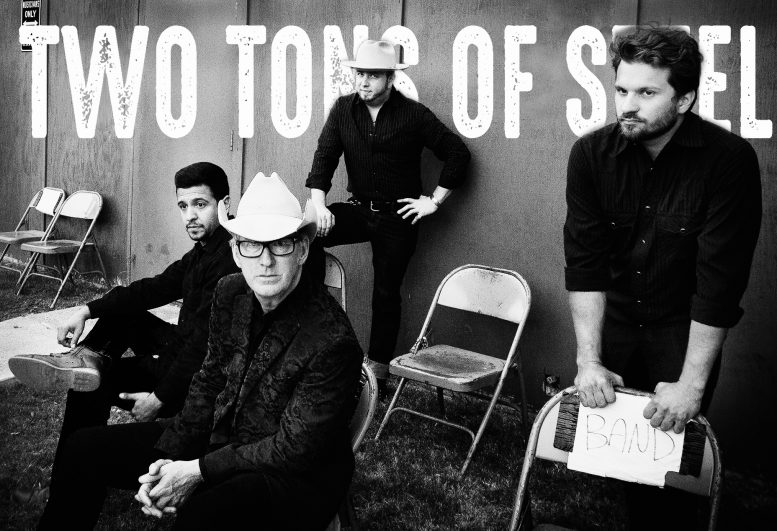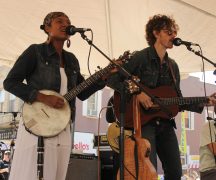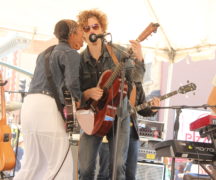By DAVID DUPONT
BG Independent News
The Black Swamp Arts Festival has prided itself on its eclectic musical offerings.
While the wide Americana music umbrella covers many of the performers, there have been plenty who reside outside that catch-all term. Think of the European, Caribbean, and African bands that have graced the festival’s stages.
While the festival may have a global reach, the performing arts committee has also consistently tapped into the roots of American music. That’s certainly the case on Friday, Sept. 7.
Ohio rocker Drew Joseph opens at 5 p.m. The acts that follow tap into the reverberations from Brooklyn, New Orleans, Austin, Nashville, and Michigan.
Here’s what’s in store under the Friday night lights on the Main Stage
Two Tons of Steel: Revving up the rockabilly sound
Named for a 1956 Coupe de Ville that served as the band’s “van,” Two Tons of Steel hails from San Antonio, Texas.
We can thank a local connection, though, for their appearance. Alex Hann, the long-time site and logistic chair for the festival, has been a fan since first hearing Two Tons at one of their regular gigs in the iconic Austin venues the Gruene Music Hall.
He was impressed by the band’s energy which had the dance floor packed from the first note, and their combination of styles. Two Tons of Steel has its roots in rockabilly and Texas swing. Perfect for the festival.
Conversations ensued, and Two Tons of Steel is now motoring into Ohio, virgin territory for the band. “It’s like being on a first date,” said leader Kevin Geil, in a recent telephone interview.
He grew up in Austin listening to rockabilly. “You could play those three chords and play a song. … It was simple and smooth, just great music. That’s where we started and that’s the foundation of how our songs are still written and performed.”
In 1992 in San Antonio, Geil started the band as a traditional three-piece rockabilly outfit with acoustic upright bass and guitars backing the vocals.
Back then the music was a novelty, and Two Tons of Steel took off. Billboard magazine wrote about them. The band appeared on the stage of the Grand Ole Opry in Nashville. A few of their songs were heard on “B” movie soundtracks.
As Geil started featuring songs he’d written, he decided to expand by adding a drummer. Later came along steel guitar, though that musician won’t be making the Midwest swing with the band.
Geil’s songs mostly get their start on his phone. He records licks and pieces of lyrics. “The majority of these songs were written on my phone.”
Geil learned his songwriting lessons well from pioneers of the genre. “I always start with the hook. … It’s all about the hook, the melody.” But the song also has to say something.
Now, that’s a mature look at love and heartbreak. In the early days, it was about cars and drinking.
Those songs as well as tributes to some of the band’s musical heroes, have been captured on a dozen recordings with another due out about the time of the festival.
Even in the age of streaming, people still like “to have something to walk away with.”
Two Tons of Steel works with a producer who should be familiar to festivalgoers. Lloyd Maines has performed several times both at the festival and Grounds for Thought with singer-songwriter Terri Hendrix, also a friend of Two Tons. Geil said Maines is credited with helping to shape the Texas sound.
“It’s the heartbeat of any band to go out and record. It keeps you motivated and excited about playing new songs,” Geil said.
“It’s exciting. It’s the first impression. You have that energy and an excitement of these people who have never heard us. ‘Let’s go, show them what we’ve got.’ It’s definitely fun.”
Billy Strings: Tapping into the magic on stage
Billy Strings was born in Lansing, Michigan, the same year Two Tons of Steel got started. But he’s an old soul in a young body.

Billy Strings (Photo provided)
From childhood he heard and learned bluegrass. His father was an avocational musician, so Strings (born William Apostol) started his education in the music about the time he was learning to tie his shoes.
As a teen, he got into Black Sabbath and played in a heavy metal band, he said in a recent telephone interview. It was a short-lived diversion. “I don’t know if I got sick of it or I realized how much bluegrass meant to me.”
Now he fronts a string band of fellow virtuosos with his own pyrotechnic guitar and vocals center stage.
His original songs blend the dazzle and heartache of bluegrass with contemporary themes. “Dealing Despair” condemns the culture of violence.
“Mostly I have to be alone when I start writing a song,” Strings said. “Sometimes in the shower, in kitchen, sometime in the bedroom. Sometime I’m looking at my reflection in the mirror. I wander around the house babbling to come up with something.”
He writes down the lyrics as they take shape, and the lyrics determine the mood and style of the music.
He may have a clear vision for the song when he presents it to the band, but it’s still incomplete. The song is like a Mr. Potato Head body, he said.
When the band plays it 50, 100 times on stage, the red sneakers, the nose, the hat get added. “You learn little tricks that you’re developing on the spot. You keep those magic things that happen.”
Now based in Nashville, Strings has been busy playing 200 shows or so a year in support of his first full-length recording “Turmoil and Tinfoil.”
The Black Swamp Arts Festival with its mixed of styles suits him just fine. Often the band with its acoustic sound will stick out among the electric guitars and drums. “We’re always glad to play that part.”
In performance he takes an open-ended approach. “We can stretch out on a long improvised jam. We like to break down the boundaries of genres, improvise and play some free-form stuff.”
Pimps of Joytime: Just call it funk
While Strings’ songs evolve through live performance, Brian Jay, founder of the Pimps of Joytime, creates fully realized versions of his songs before presenting them to the band.
He’ll bring in a studio recording of the music, and the band takes it from there.
That’s not surprising given the five-piece band (guitar, bass, drums and two percussion-wielding singers) started as a solo project.
Jay, grew up in Egypt, with a father who loved music. “My dad was a big fan of music so he played a lot of great music around the house.” The soundtrack of his youth included a lot of 1950s rock ‘n’ roll, blues, New Orleans jazz, and some rock – the music that laid the foundation for what he plays now.

Pimps of Joytime (Photo provided)
The Pimps’ sound is comprised of a lot of elements. “We just call it funk for lack of a better name. It tends to be very rhythmic.”
The enduring influence of New Orleans is evident in the band’s collaborations with members of the Neville Brothers.
Jump ahead to New York in 2007. Jay, who started playing drums before taking up guitar, decided he wanted to record an album. He holed up in the studio, laying down all the tracks himself.
When the album hit the streets, he needed a live band to play the release party. So he assembled the Pimps of Joytime. Then the band landed a residency at the legendary Brooklyn venue Black Betty.
The personnel has shifted over the years with singer Marteana Morales dating back to those the early years.
Jay looks for more than technical ability in enlisting musicians. “You have to have a musical rapport with what I do. … It’s a little more than talent. Someone has to jell with the musical style. It’s a vibe thing. You have to be enthusiastic. You have to want to do it.”
The Pimps are selective on how many shows they do. Their schedule shows them performing a show every couple weeks. “That’s intentional,” Jay said. “We don’t want to be working like crazy. I’ve tried to find a balance. You don’t want to give it all up.”
The Black Swamp Arts Festival “seemed like fun, with a good vibe.”
“We like the festival scene,” he said. “You play outdoor and it’s summer, and everyone is in a good mood. That tends to be fun way to do things.”





